
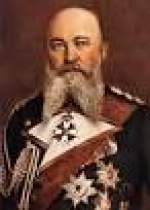
1849 Birth: Alfred von Tirpitz: German Admiral, Minister of State and Commander of the Kaiserliche Marine in World War I from 1914 until 1916. Tirpitz developed a "risk theory" (an analysis which today would be considered part of game theory) whereby, if the German Navy reached a certain level of strength relative to the British Navy, the British would try to avoid confrontation with Germany (that is, maintain a fleet in being). If the two navies fought, the German Navy would be destroyed but the British Navy would be fatally crippled. Because the British relied on their navy to maintain control over the British Empire, Tirpitz felt they would rather keep control of the empire, and let Germany become a world power, than lose the empire as the cost of keeping Germany less powerful. This theory sparked a naval arms race between Germany and Great Britain in the first decade of the 20th century.
1905 Birth: Albert Speer: Hitler's architect, wartime armaments minister, criminal:

In 1934 Hitler noticed me for the first time. I became acquainted with him and from that period of time onward I exercised my architect's profession with joy and enthusiasm, for Hitler was quite fanatical on the subject of architecture; and I received many important construction contracts from him. Along with putting up a new Reich Chancellery in Berlin and various buildings on the Party Rally grounds here in Nuremberg, I was entrusted with the replanning of the cities of Berlin and Nuremberg.
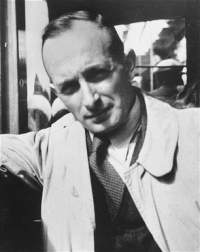
1906 Birth: Adolf Eichmann: SS Lieutenant Colonel and head of IVB4, the Jewish department of the RSHA. Eichmann, who was raised in Austria, served as official secretary during the Wannsee Conference and was instrumental in implementing the "Final Solution," organizing transports of Jews from all over Europe to the Nazi killing centers in the East. He was arrested at the end of the war in the American zone of Germany, and later managed to escape to Latin America. In 1960, members of the Israeli Secret Service (Mossad) discovered Eichmann in Argentina, kidnapped him, and secretly flew him to Israel for trial. He was tried in Jerusalem (April- August 1961), sentenced to death (December 2, 1961), and executed (May 31, 1962). His ashes were scattered at sea.
1916 Various: First U.S. air combat mission begins:
Eight Curtiss "Jenny" planes of the First Aero Squadron take off from Columbus, New Mexico, in the first combat air mission in U.S. history. The First Aero Squadron, organized in 1914 after the outbreak of World War I, was on a support mission for the 7,000 U.S. troops who invaded Mexico to capture Mexican revolutionary Pancho Villa.
On March 9, 1916, Villa, who opposed American support for Mexican President Venustiano Carranza, led a band of several hundred guerrillas across the border on a raid of the town of Columbus, New Mexico, killing 17 Americans. On March 15, under orders from President Woodrow Wilson, U.S. Brigadier General John J. Pershing launched a punitive expedition into Mexico to capture Villa. Four days later, the First Aero Squadron was sent into Mexico to scout and relay messages for General Pershing.
Despite numerous mechanical and navigational problems, the American fliers flew hundreds of missions for Pershing and gained important experience that would later be used by the pilots over the battlefields of Europe. However, during the 11-month mission, U.S. forces failed to capture the elusive revolutionary, and Mexican resentment over U.S. intrusion into their territory led to a diplomatic crisis. In late January 1917, with President Wilson under pressure from the Mexican government and more concerned with the war overseas than with bringing Villa to justice, the Americans were ordered home. (History.com)
World War I: Gefreiter Adolf Hitler endures trench warfare in Flanders (Artois) with 3 Company, 16 Reserve Infantry Regiment [List Regiment]. [For further details, Click here.]
1918 World War I: Brest-Litovsk Peace Treaty: Count Georg von Hertling's Address to the Reichstag:
Hypocrisy has become second nature to the enemy, whose untruthfulness is made worse by its brutality. Every attempt at calm explanation and every real deliberation must fail, when the enemy, at the very moment he is laying a heavy hand on a neutral country, dares to speak of a policy guided by complete unselfishness. The treaty with Russia contains no conditions disgraceful to Russia, if the provinces breaking away from Russia say it is in accordance with their own wish and the wish is accepted by Russia. Courland and Lithuania have long been united to Germany politically, economically, and militarily. Livonia and Esthonia are the eastern frontier fixed by the treaty, but we hope that they also will have close and friendly relations with Germany; not, however, to the exclusion of their friendly relations with Russia. Poland is not mentioned in the treaty, and we shall endeavour to see if it is possible to live in stable and good-neighbourly relations with the new state.
1920 Treaty of Versailles again rejected by the US Senate: The US Senate also strongly objects to the US entering the League of Nations.
1921 Slovenia: Italian Fascists shoot from a train to a group of children in Strunjan: "The most tragic event in the railway's history occurred on March 19, 1921 at 18:20. A group of fascists was travelling to Trieste. During the stop in Strugnano/Strunjan they shot from the train at a group of children playing near the track. Two children were killed, two maimed, and three wounded."
1933 Boycott: The Jewish War Veterans of America initiates an anti-Nazi boycott.
1934 Poland: Foreign interests: An article in the New York Times reports that the Polish government is fighting back against American and German stockholders who control "Poland's largest industrial unit, the Upper Silesian Coal and Steel Company. Two-thirds of the company's stock is owned by Friedrich Flick, a leading German steel industrialist, and the remainder is owned by interests in the United States." Note: the interests referred to being Averell Harriman, George Herbert Walker and Prescott Bush among others. (THP)
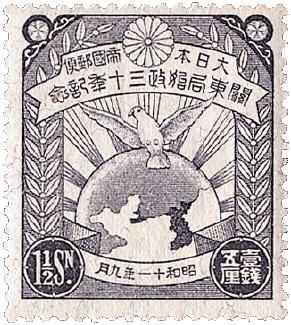
1936 Far East: The USSR signs a pact of assistance with Mongolia against Japan.
[See: Countdown to Infamy: Timeline to Pearl Harbor.]1937 Birth: Egon Krenz: President of East Germany.
1941 World War II: Murmansk: From official notes of the German naval war staff: "In case of Barbarossa, Supreme Naval Commander describes the occupation of Murmansk as an urgent request of the Navy; Chief of Supreme Command Armed Forces considers compliance very difficult."
1942 World War II: US Draft: All men in the United States between the ages of 45 and 64, about 13 million, are ordered to register with the draft boards for non-military duty.
1943 Various: From a secret SS order:
The activity of the labor offices, that is, of recruiting commissions, is to be supported to the greatest extent possible. It will not be possible always to refrain from using force. During a conference with the chief of the labor avocation staffs, it was agreed that whatever prisoners could be released should be put at the disposal of the commissioner of the labor office. When searching villages or when it becomes necessary to burn down villages, the whole population will be put at the disposal of the commissioner by force . . . . As a rule, no more children will be shot.
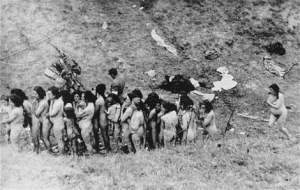
Einsatzgruppe: From a letter from the headquarters of one of the Commando groups, a section known as Einsatz Group C:
It is the task of the Security Police and of the Security Service (SD) to discover all enemies of the Reich, and fight against them in the interest of security, especially the security of the Army in the zone of operations. Besides the annihilation of active, avowed opponents, all other elements who by virtue of their convictions or their past might under favorable conditions actively appear as enemies are to be eliminated through preventive measures. The Security Police carries out this task according to the general directives of the Fuehrer, with all required severity. Energetic measures are especially necessary in territories endangered by the activity of partisan bands. The competence of the Security Police within the zone of operations is based on the 'Barbarossa' decrees. I deem the measures of the Security Police, carried out on a considerable scale during recent times, necessary for the two following reasons:
1. The situation at the front in my sector had become so serious that the population, partly influenced by Hungarians and Italians who were streaming back in confusion, were openly opposing us.
2. The strong expeditions by partisan bands, coming chiefly from the forest of Bryansk, were another reason. Besides that, other partisan groups formed from the population were appearing like mushrooms in all districts. The procurement of arms evidently provided no difficulties at all. It would have been inexcusable if we had observed this whole activity without taking measures against it. It is obvious that all such measures are accompanied by severity. I want to take up the significant points of these severe measures:
1) The shooting of Hungarian Jews;
2) the shooting of agriculturalists;
3) the shooting of children;
4) the burning to the ground of villages;
5) the shooting, 'while trying to escape,' of Security Service (SD) prisoners.
Chief of Einsatz Group C confirmed once more the suitability of the measures executed and expressed his appreciation for the drastic steps taken. In consideration of the current political situation, especially in the armament industry in the fatherland, the measures of the Security Police are to be subordinated to the greatest extent to the recruiting of labor for Germany. In the shortest possible time the Ukraine has to place at the disposal of the armament industry 1 million workers, 500 of whom have to be sent from our territory daily
1. Special treatment is to be kept to a minimum.
2. The listing of communist functionaries, activists, and so on, is to take place only by roster for the time being, without arrests. It is, for instance, no longer feasible to arrest all the close relatives of a member of the Communist Party. Likewise members of the Komsomolz are to be arrested only if they were active in leading positions . . . .
5. The reporting of partisan bands as well as drives against them is not affected hereby. I point out, however, that all drives against those bands are to take place only with my approval.
6. The prisons are to be kept empty as a rule.
We must be aware of the fact that the Slavs interpret all soft treatment on our part as weakness and that they will act accordingly, right away. If were strict our harsh Security Police measures through the above orders for the time being, it is done only for the following reason: the most important thing is the recruiting of workers. No check of persons to be sent into the Reich will be made. There are therefore no written certificates of political reliability or the like to be furnished. -Christensen, SS Sturmbannfuehrer and Commanding Officer.
1944 World War II: Hungary: Hitler sends German troops into Hungary and forces the establishment of a more compliant government. Suddenly more than 750,000 Jews, who previously had seemed relatively safe from Nazi terror and deportation, come under Nazi domination. (THP) [See: Was the Holocaust Detrimental to Hitler's War Effort?]
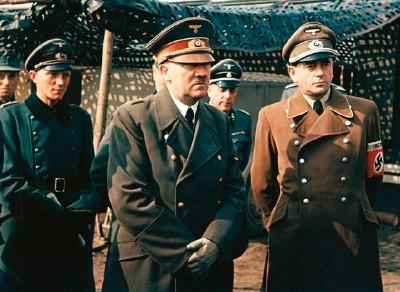
1945 World War II: Various: The Nero Decree is issued by Hitler
Measures for destructions in Reich Territory: The struggle of our nation for existence also forces the utilization of all means to weaken the fighting power of our enemy and to prevent further advances. Advantage must be taken of all opportunities to inflict the most enduring damage to the striking power of the enemy directly or indirectly. It is a mistake to believe in the possibility of work resumption for our own purposes of undestroyed or only temporarily paralyzed traffic, communications, industrial, and supply installations after the recapture of lost territories. On his retreat the enemy will leave behind only scorched earth and refrain from any consideration for the population. I therefore command:
1. All military traffic, communications, industrial and supply installation as well as objects on Reich territory, which the enemy might immediately or later utilize for the continuation of his fight, are to be destroyed.
2. The military commands are responsible for the execution of this destruction of all military objects including traffic and communications installations. The Gauleiters and Commissioners for Reich Defense are responsible for the destruction of the industrial and supply installations as well as of other valuable objects; the Gauleiter and Commissioners for Reich Defense are to be given necessary assistance by the troops in carrying out this task.
3. This command is to be transmitted as promptly as possible to all troop commanders; orders to the contrary are null and void. Adolf Hitler. [See: Why Did Hitler Insist on No Surrender?]
War in the Pacific: Off the coast of Japan a Yokosuka D4Y ("Judy") dive bomber, though other accounts suggest an Aichi D3A ("Val"), also a dive bomber, pierced the cloud cover and made a low level run on the aircraft carrier USS Franklin to drop two semi-armor-piercing bombs, killing 800 of her crew and crippling the ship. The fifth USS Franklin (CV-13), nicknamed "Big Ben", was an Essex-class aircraft carrier of the United States Navy, notable as the hardest-hit carrier to survive World War II. The actual attacks on the ship are depicted in the 1949 film Task Force.
General Fromm executed for plot against Hitler:

The ex-commander of the German Home Army, Gen. Friedrich Fromm, is shot by a firing squad for his part in the July plot to assassinate the Fuhrer. The fact that Fromm's participation was half-hearted did not save him.
By 1944, many high-ranking German officials had made up their minds that Hitler must die. He was leading Germany in a suicidal war on two fronts, and they believed that assassination was the only way to stop him. According to the plan, coup d'etat would follow the assassination, and a new government in Berlin would save Germany from complete destruction at the hands of the Allies. All did not go according to plan, however. Col. Claus von Stauffenberg was given the task of planting a bomb during a conference that was to be held at Hitler's holiday retreat, Berchtesgaden (but was later moved to Hitler's headquarters at Rastenburg). Stauffenberg was chief of staff to Gen. Friedrich Fromm. Fromm, chief of the Home Army (composed of reservists who remained behind the front lines to preserve order at home), was inclined to the conspirators' plot, but agreed to cooperate actively in the coup only if the assassination was successful.
On the night of July 20, 1944, Stauffenberg planted an explosive-filled briefcase under a table in the conference room at Rastenburg. Hitler was studying a map of the Eastern Front as Colonel Heinz Brandt, trying to get a better look at the map, moved the briefcase out of place, farther away from where the Fuhrer was standing. At 12:42 p.m. the bomb went off. When the smoke cleared, Hitler was wounded, charred, and even suffered the temporary paralysis of one arm‑-but was very much alive.
Meanwhile, Stauffenberg had made his way to Berlin to meet with his co-conspirators to carry out Operation Valkyrie, the overthrow of the central government. Once in the capital, General Fromm, who had been informed by phone that Hitler was wounded but still alive, ordered Stauffenberg and his men arrested, but Fromm was located and locked in an office by Nazi police. Stauffenberg and Gen. Friedrich Olbricht began issuing orders for the commandeering of various government buildings. Then the news came through from Herman Goering that Hitler was alive. Fromm, released from confinement by officers still loyal to Hitler, and anxious to have his own association with the conspirators covered up quickly, ordered the conspirators, including two Stauffenberg aides, shot for high treason that same day. (Gen. Ludwig Beck, one of the conspiracy leaders and an older man, was allowed the "dignity" of committing suicide.)
Fromm's last-ditch effort to distance himself from the plot failed. Within the next few days, on order of Heinrich Himmler, who was now the new head of the Home Army, Fromm was arrested. In February 1945, he was tried before the People's Court and denigrated for his cowardice in refusing to stand up to the plotters. But because he went so far as to execute Stauffenberg and his partners on the night of July 20, he was spared the worst punishment afforded convicted conspirators: strangulation on a meat hook. He was shot by a firing squad on March 19. (History.com)
1946 Death: Chaim Hirschmann—one of only two survivors of the death camp at Belzec—is killed in Lublin during continuing anti-Semitic violence. (THP)
1949 Cold War: East Germany approves new constitution:
In a precursor to the establishment of a separate, Soviet-dominated East Germany, the People's Council of the Soviet Zone of Occupation approves a new constitution. This action, together with the U.S. policy of pursuing an independent pathway in regards to West Germany, contributed to the permanent division of Germany.
The postwar status of Germany had become a bone of contention between the United States and the Soviet Union even before World War II ended. The Soviet Union wanted assurances that Germany would be permanently disarmed and demanded huge reparations from the postwar German government. The United States, however, was hesitant to commit to these demands. By 1945, many U.S. officials began to see the Soviet Union as a potential adversary in the postwar world and viewed a reunified-and pro-West-Germany as valuable to the defense of Europe. When the war ended in May 1945, Russian forces occupied a large portion of Germany, including Berlin. Negotiations between the United States, Russia, Britain, and France resulted in the establishment of occupation zones for each nation. Berlin was also divided in zones of occupation. While both the United States and Russia publicly called for a reunified Germany, both nations were coming to the conclusion that a permanently divided Germany might be advantageous.
For the United States, West Germany, with its powerful economy and potential military strength, would make for a crucial ally in the developing Cold War. The Soviets came to much the same conclusion in regards to East Germany. When, in 1949, the United States proposed the North Atlantic Treaty Organization (a military and political alliance between America and several European states) and began to discuss the possible inclusion of a remilitarized West Germany in NATO, the Soviets reacted quickly. The new constitution for East Germany, approved by the People's Council of the Soviet Zone of Occupation (a puppet legislative body dominated by the Soviets), made clear that the Russians were going to establish a separate and independent East Germany. In October 1949, the German Democratic Republic (East Germany) was declared. Months earlier, in May, the Federal Republic of Germany (West Germany) had been formally proclaimed. Germany remained a divided nation until the collapse of the communist government in East Germany and reunification in 1990. (History.com)
1953 Spandau Prison: From Spandau: The Secret Diaries, by Albert Speer:
All this evening of my Birthday I have kept going at the memoirs . . . . Interruption. Funk at my peephole. "Come over to my cell. I have to show you something interesting." Irritated by the disturbance, which violates our usual social forms, I do not react. After fifteen minutes Funk is back. "Do come, it is really interesting." I have my cell unlocked. "Put out the light," Funk says. "Do you see the moon with the stars in front of it? That is the Turkish sign for good luck." Long (the guard) is bored, because Funk showed him the same thing a few minutes ago, and disappears. In the darkness Funk thrusts a cup toward me and whispers, "Quick, drink! To your forty-eighth birthday! What you dream tonight will be fulfilled." Where in the world can he have got this excellent cognac? (Speer II)
Edited by Levi Bookin (Copy editor) Click to join 3rdReichStudies FAIR USE NOTICE: This site may contain copyrighted material the use of which has not always been specifically authorized by the copyright owner. We are making such material available in our efforts to advance understanding of historical, political, human rights, economic, democracy, scientific, environmental, and social justice issues, etc. We believe this constitutes a 'fair use' of any such copyrighted material as provided for in section 107 of the US Copyright Law. In accordance with Title 17 U.S.C. Section 107, the material on this site is distributed without profit to those who have expressed a prior interest in receiving the included information for research and educational purposes. If you wish to use copyrighted material from this site for purposes of your own that go beyond 'fair use', you must obtain permission from the copyright owner. Please note that the list-owner and the moderator are not responsible for, and do not necessarily approve of, the random ads placed on our pages by our web server. They are, unfortunately, the price one pays for a 'free' website.
levi.bookin@gmail.com






